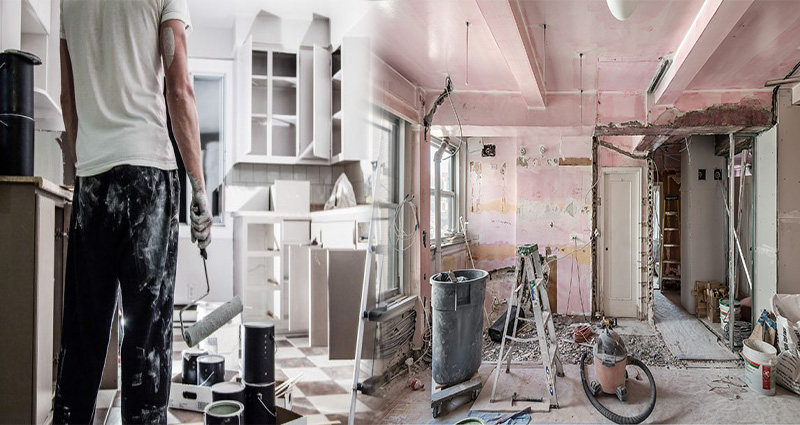There are many reasons to renovate a property, from wanting to create a rental asset to needing more space for your family. Whatever your motivation, the project can be overwhelming if you don’t do it right. That’s why we’ve put together this guide full of tips and tricks that will help you make sure your home renovation is as smooth as possible.
Never underestimate the cost of renovating.
When you’re planning a renovation, it’s important to be aware of all the costs involved. You may think that renovating an old home will be cheaper than building from scratch, but this isn’t always the case. The cost of materials and labour can vary significantly depending on the project. For example, if your house has asbestos in its walls (which many older homes do), then removing it will cost more than just replacing drywall with new insulation because there is special equipment required for safe removal.
The other thing to consider is clean-up after your renovations are complete: when doing extensive remodelling work such as knocking down walls or installing new floors or ceilings throughout an entire room or house; there’s bound to be some mess left behind by workers who were working on those projects during construction time periods where they aren’t able use certain tools like power drills yet because they haven’t been installed yet either so if someone walks around inside without shoes on their feet then they run risk being injured by stepping into something sharp while walking around barefoot inside these areas until everything else gets put back together again safely once again after these projects have been completed successfully!
Always plan for surprises.
- Plan for surprises.
- What are the potential surprises that can occur? What are the potential problems that can arise from these surprises?
- How can you avoid the unexpected and deal with it if it does happen?
Do your research before you begin.
Before you begin, there are a few things you’ll want to do. First, check with your local council to find out what permits and approvals are required for your renovation project. Next, make sure that your budget is realistic for the scope of work being done and that it accounts for all necessary expenses like insurance and materials. Finally, look into any restrictions on the property (for example: “no new windows” or “must keep roofing material intact”) so that you don’t end up with surprises later on in the renovation process!
When choosing a contractor who can help with these tasks (or if this is all too much work), consider hiring an architect instead–they’ll be able to guide your decisions from start-to-finish while also being able to answer any questions along the way.
Choose your tradesman carefully.
As with any other type of work, it’s important to find a tradesman you can trust.
You should check their references and ask them for a detailed quote before hiring them. Make sure they are qualified to do the job and have insurance in case anything goes wrong during renovations or repairs. Also, check that they’re registered with a relevant professional body such as the National Association of Plumbers (NAP).
Be prepared to manage multiple projects at the same time.
When you’re doing a renovation, it’s easy to feel overwhelmed by the amount of work that needs to be done. You might even think about trying to do everything at once–but don’t! Instead, break up your project into smaller tasks and work on them one at a time.
If you’re not sure where to start or what exactly needs doing in each room or area of your house, hire an architect or interior designer who can help guide you through this process and make sure all of your bases are covered. If possible, ask these professionals for recommendations on contractors who specialize in their respective fields (architecture/interior design). They’ll be able to give advice on how best to proceed with renovations based on their experience working with clients like yourself.
Understand that the project may take longer than you expect it to take.
When you’re renovating a property, it’s easy to underestimate how long it will take. You might think that because you have all the right tools and experience in this area that things will be done quickly. But there are always going to be delays, so don’t bank on finishing your project within a tight time frame.
If you do find yourself running behind schedule (and there’s no reason why this shouldn’t happen), make sure that you have an action plan in place for when these situations occur. What will happen if the electrician doesn’t show up on time? What if one of your workers gets sick? You need answers for these types of questions before they arise so that nothing comes as a surprise when things go awry during renovation projects–and trust me: they will go awry at some point!
Don’t forget about health and safety, even on a small project!
A clean workspace is important for a number of reasons. It’s not just about keeping your tools and materials organized, but also about protecting yourself and others from injury.
Electrical safety is also important to consider when planning a renovation project. The National Electrical Code (NEC) requires that all electrical outlets be GFCI-protected, which means they have built-in circuit breakers that prevent electrical shock if they’re overloaded or shorted out by water or other conductors. All circuits should be protected with ground fault circuit interrupters (GFCIs) as well; this ensures that any power surges caused by static electricity or sudden contact with water will trip the breaker before causing harm to anyone nearby. It’s especially crucial to make sure these devices are installed correctly if you plan on doing any electrical work yourself!
Fire safety should also be considered when renovating; building codes require certain types of materials depending on what part of your home needs renovation work done on it (for example: kitchens must have nonflammable countertops). You may need additional insurance coverage as well if there’s any possibility whatsoever that something could happen while working on your home–so make sure those policies are up-to-date!
It’s important to manage your expectations when renovating a property
It’s important to manage your expectations when renovating a property. It’s easy to get carried away and think that you’ll be able to get everything done in a short time, at the same cost and with perfection. But that rarely happens!
- Don’t expect to get everything done in a short time: Renovations take time–and lots of it! You may have heard stories about people who built themselves new houses from scratch over just six months or so, but these are generally exceptions rather than the rule. Even if you’re not planning an entire house renovation project yourself, there will still be plenty of time spent waiting on contractors (who often take longer than expected) and making sure everything is done properly before moving into your newly renovated home or apartment.* Don’t expect everything at once: If you’re doing more than one renovation project at once (such as updating both kitchen cabinets and bathrooms), try not too focus too much on one aspect until another one has been completed.* Don’t forget about costs: This doesn’t mean trying not spend any money at all; instead keep tabs on how much each item costs so far so that if something goes wrong later down line such as needing extra materials because some weren’t included initially then there won’t be any surprises when finalizing invoices from contractors/suppliers etc…
We hope that this article has given you some insight into the process of renovating a property and given you some ideas on how to manage your expectations. If you’re thinking about embarking on a renovation project, we would recommend doing as much research as possible before committing yourself. It’s also worth considering hiring an experienced contractor who can guide you through the process and help manage any unexpected costs or delays along the way.











